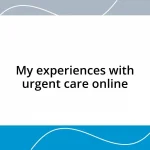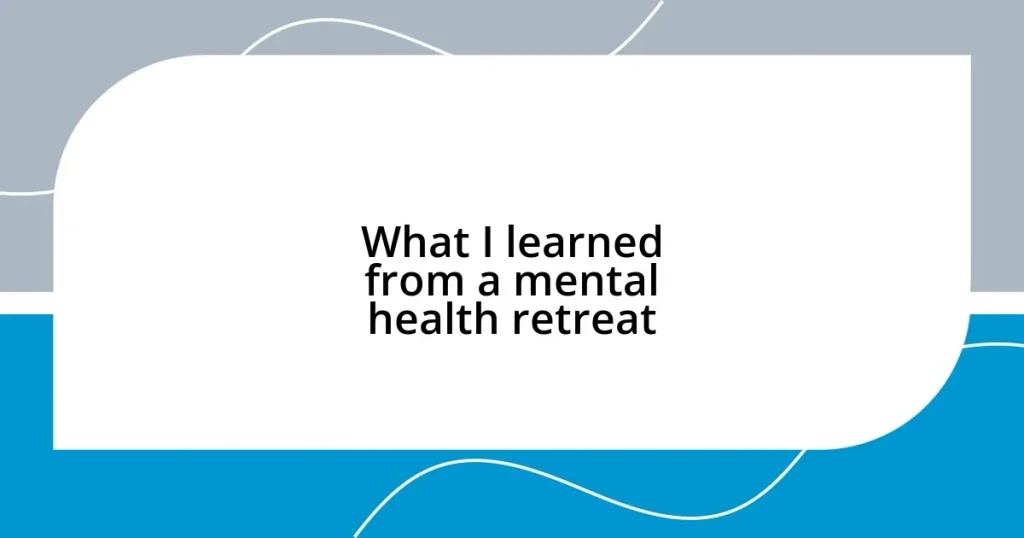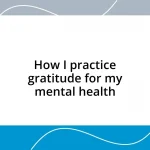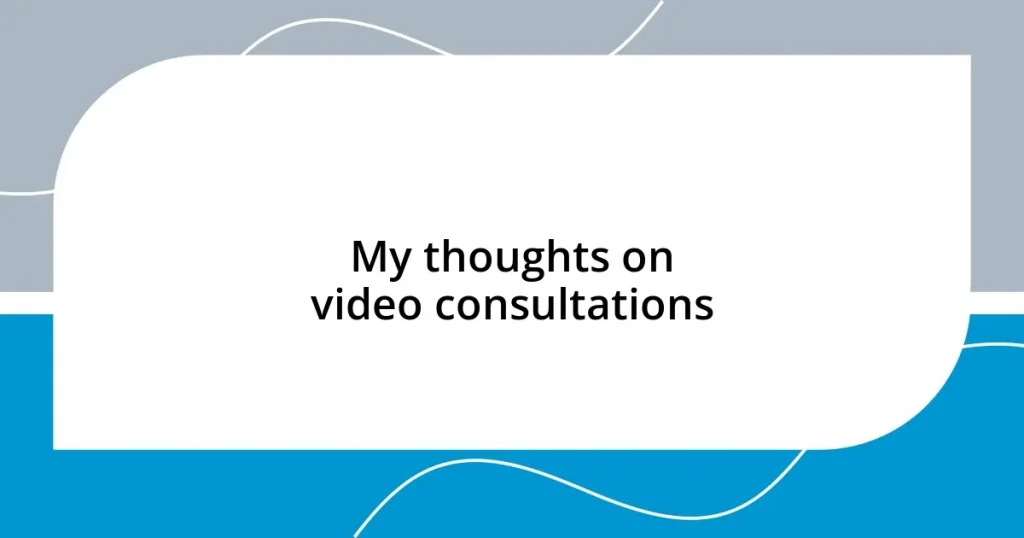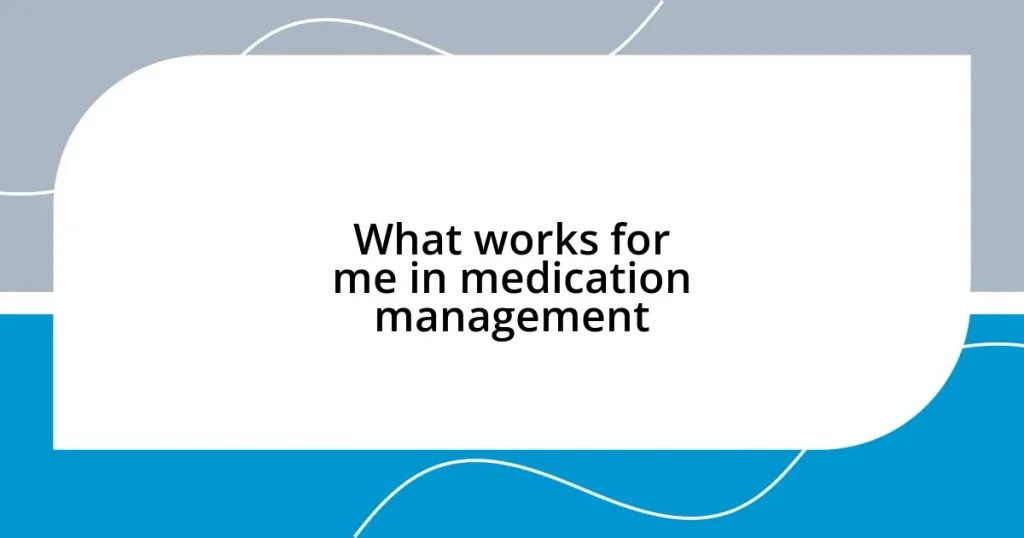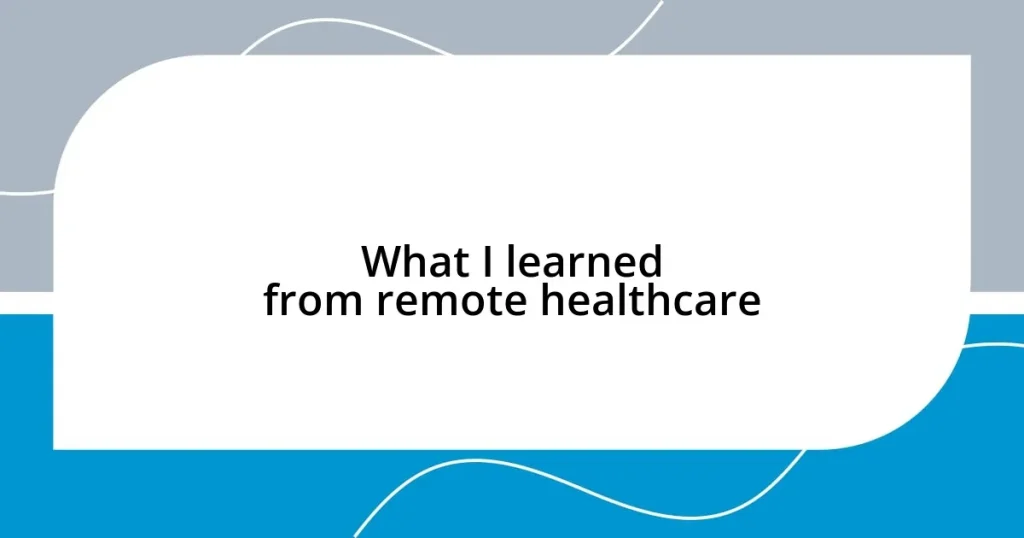Key takeaways:
- Mental health retreats offer immersive environments for self-exploration, fostering personal growth through activities like meditation and group sharing.
- Setting personal goals enhances the retreat experience, helping individuals focus on specific areas such as mindfulness and vulnerability.
- Integration of retreat lessons into daily life, such as practicing self-compassion and gratitude, leads to long-term emotional resilience and deeper relationships.
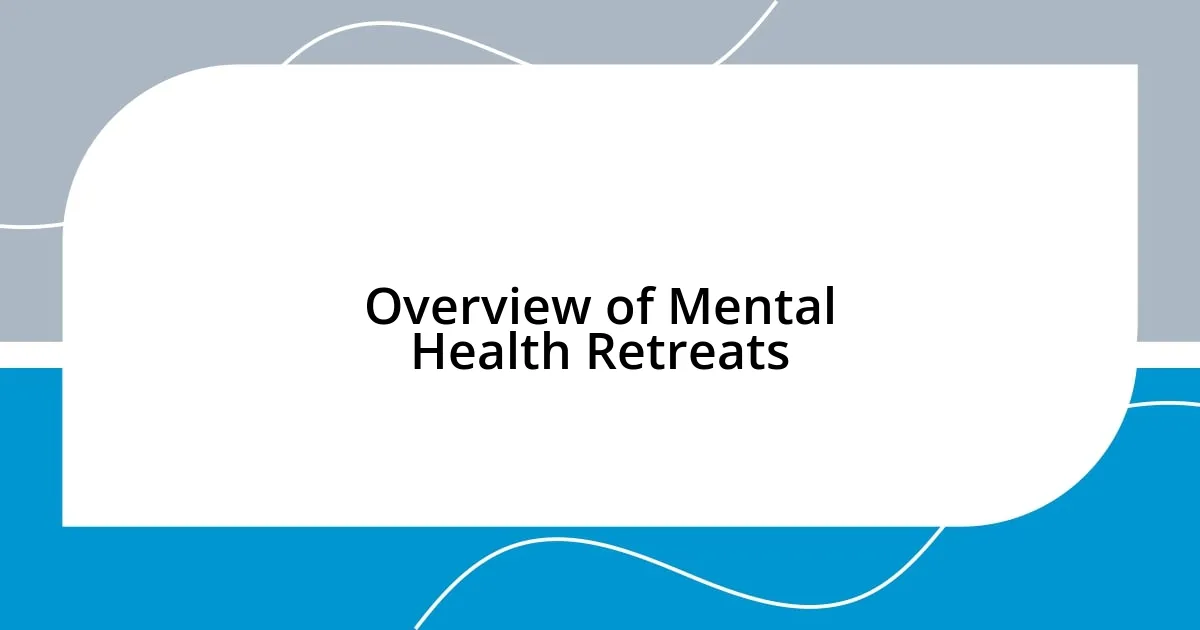
Overview of Mental Health Retreats
Mental health retreats are designed as immersive experiences that provide space for individuals to reconnect with themselves. Participants often find themselves in serene settings, far removed from the hustle of daily life, which can feel like a much-needed breath of fresh air. I remember my first retreat where simply being in nature helped quiet my mind, prompting me to reflect deeply on my emotional well-being.
These retreats typically offer a variety of activities, such as meditation, yoga, and therapy sessions, aimed at promoting mental and emotional healing. I recall the first guided meditation session I attended; I was hesitant at first, struggling to sit still. But as the instructor led us through breathing exercises, I felt layers of tension begin to melt away. Have you ever experienced a moment where you felt genuinely present and at peace? It’s astounding how the right environment can facilitate such transformations.
Each retreat is unique, catering to different needs and preferences, whether focused on mindfulness, stress management, or personal growth. Personally, I was pleasantly surprised to meet people from various backgrounds, all searching for similar healing and understanding. This sense of community can be incredibly powerful, reinforcing the idea that none of us are truly alone in our struggles.
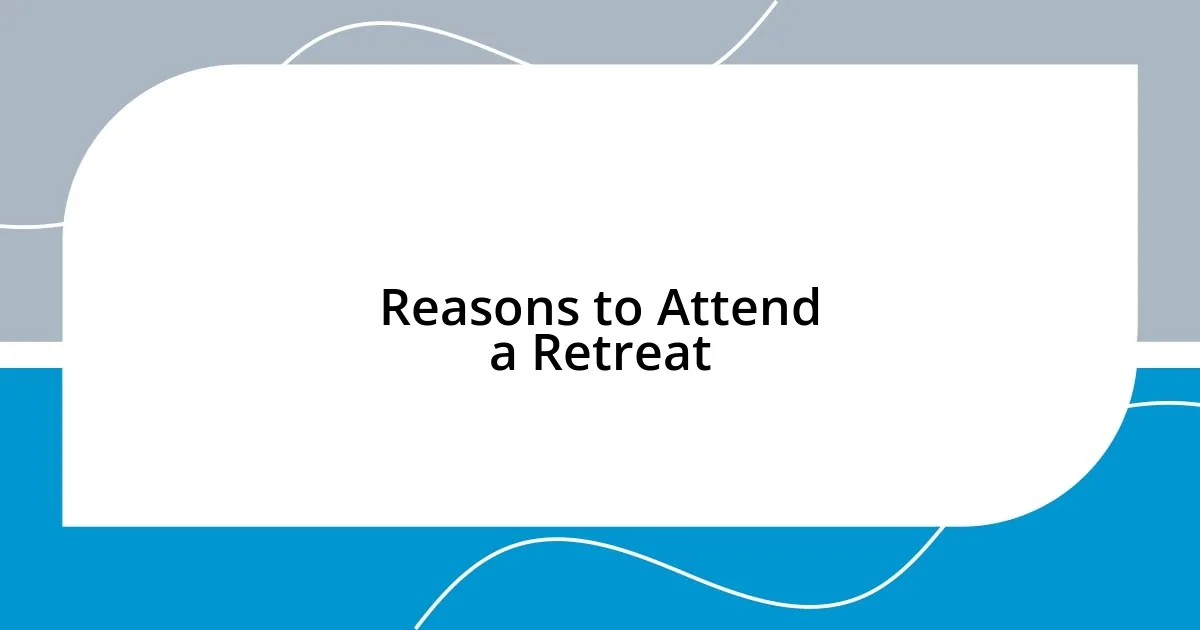
Reasons to Attend a Retreat
Attending a retreat can be a transformative experience for many reasons. One significant aspect is the opportunity to disconnect from digital distractions and immerse oneself in real, face-to-face interactions. When I attended my retreat, I struggled at first with being away from my phone but soon found immense joy in the genuine conversations with fellow participants. It felt like reconnecting with a part of myself that had been lost in the busyness of life.
Another compelling reason to consider a retreat is the structured environment that fosters self-exploration. In the tranquil setting, I engaged in various workshops aimed at personal development. I still remember the moment during a journaling exercise when I uncovered feelings I had suppressed for years. It was a mix of vulnerability and liberation—an experience that simply wouldn’t have happened in my usual routine.
Perhaps what truly sets retreats apart is the expert guidance they offer. Experienced facilitators can provide valuable insights and tools that are often hard to come by in everyday life. I recall a session led by a skilled therapist who taught us grounding techniques that I still use today. Learning from someone who genuinely understands the complexities of mental health can be incredibly empowering.
| Reasons to Attend | Personal Experience |
|---|---|
| Disconnect from Digital Distractions | Engaging conversations replaced my phone’s hold on me. |
| Structured Environment for Self-Exploration | Journaling led to profound personal revelations. |
| Expert Guidance from Facilitators | Learning grounding techniques changed my coping strategies. |
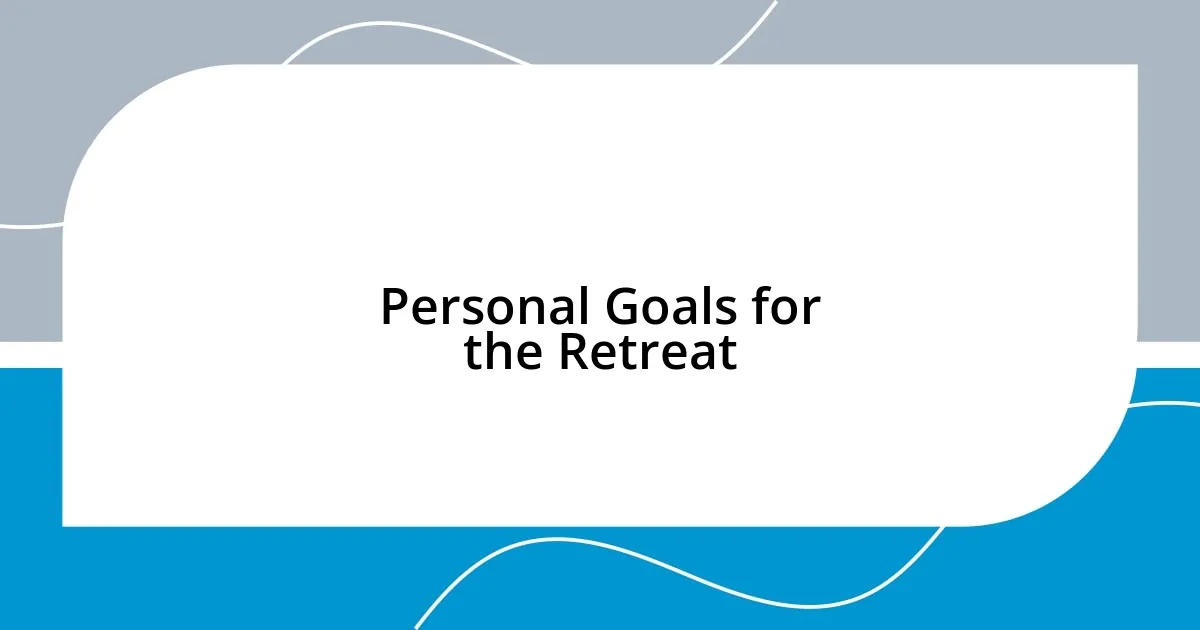
Personal Goals for the Retreat
Setting personal goals for a mental health retreat can significantly enhance the experience and make it more meaningful. I recall arriving at my retreat with a desire to break free from negative thought patterns that often cloud my mind. It felt empowering to set clear intentions, like practicing gratitude daily and learning to embrace vulnerability. I learned that when you lay out what you hope to achieve, you create a roadmap for your emotional journey.
Here are some personal goals you might consider for your retreat:
- Cultivate Mindfulness: Focus on being present in each moment. I found this practice really helps when dealing with anxiety.
- Explore Vulnerability: Challenge yourself to share your thoughts and feelings openly. I remember feeling a weight lift off my shoulders after sharing my fears in a group session.
- Develop a Self-Care Routine: Identify practices that nurture your mental health, such as journaling or meditation. I started journaling daily and it became a pivotal part of my routine post-retreat.
- Connect with Others: Make an effort to forge connections with fellow participants. I was surprised by how quickly we built trust and understanding over shared experiences.
- Create a Personal Action Plan: Outline steps to implement what you’ve learned during the retreat in everyday life. Writing it down made the changes feel so much more tangible and achievable.
Setting these goals not only gave me direction but also allowed me to reflect on my progress, making the retreat an unforgettable experience. Each step I took during the days felt purposeful, and the sense of accomplishment at the end was incredibly fulfilling.
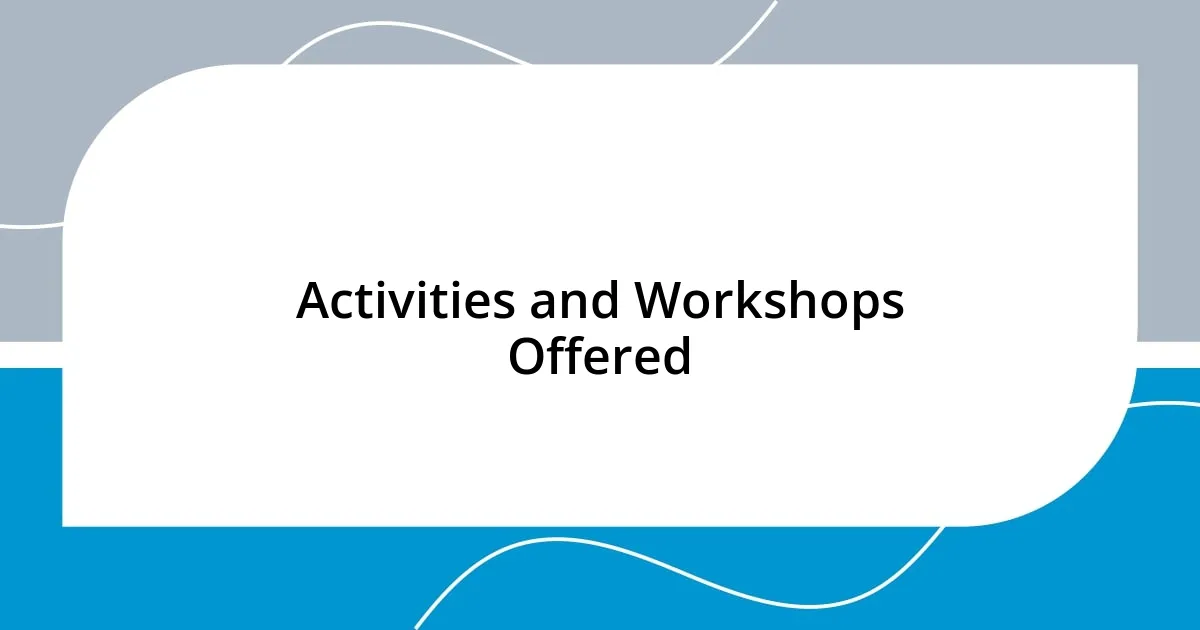
Activities and Workshops Offered
One of the most engaging activities I experienced was a guided meditation session. As we sat in a circle, the facilitator led us through breathing techniques that brought an overwhelming sense of peace. I remember thinking, “How can something so simple feel so profoundly calming?” This session introduced me to a space of stillness that I had forgotten existed.
Workshops during the retreat were equally transformative. I participated in a creativity workshop that encouraged us to express our emotions through art. I was apprehensive at first; I’ve never considered myself an artist. However, as I splashed colors onto the canvas, I felt feelings emerge that I hadn’t acknowledged before—sadness, joy, confusion. It was a beautiful moment of release that proved how creative expression could be a powerful outlet for emotional release.
Another standout experience for me was the movement workshop, which incorporated yoga and dance. Honestly, I was skeptical of how it would help, but stepping into that space liberated me. I danced freely, shaking off the weight I carried, and in that moment, I realized how our bodies hold onto tension. I’ve carried those tools with me since, making movement a part of my daily routine for emotional relief. I often ask myself: how often do we forget to listen to what our body needs? This retreat reminded me to stay in tune with my physical and emotional self.
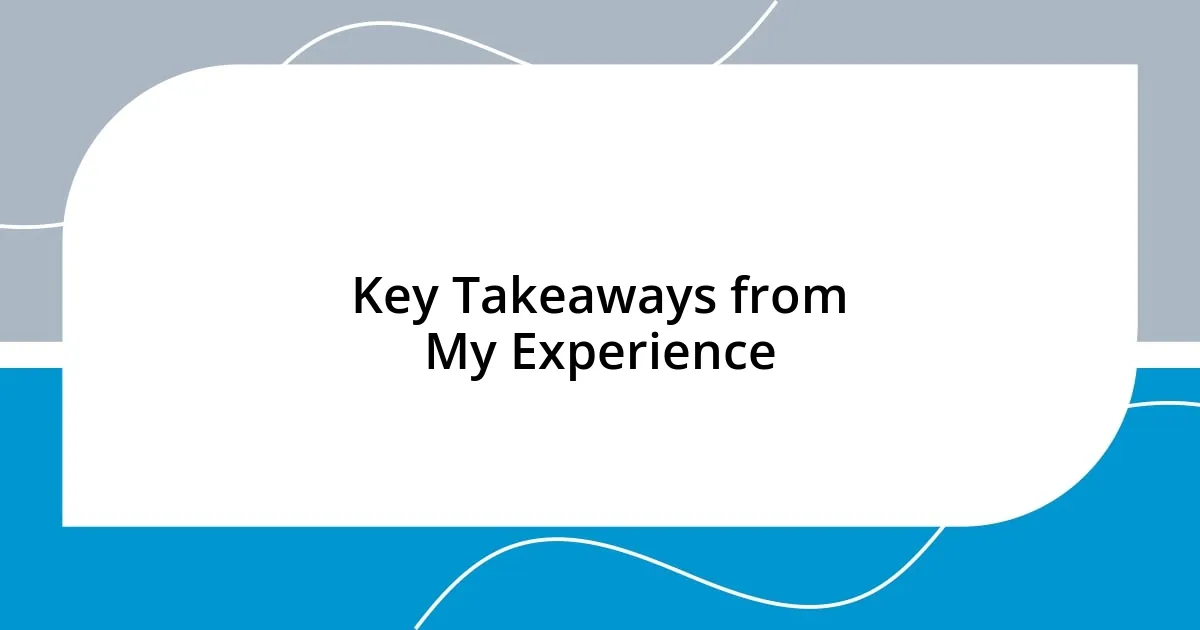
Key Takeaways from My Experience
Reflecting on my retreat experience, one of the key takeaways was the profound impact of vulnerability. During a heartfelt sharing circle, I opened up about my struggles with self-doubt. It was a moment that shook me to the core. I realized that by expressing my fears, I not only freed myself but also witnessed others do the same. This collective vulnerability created a powerful bond that lingered long after the retreat was over.
Another takeaway that stays with me is the importance of now. I remember a day when we did a ‘mindful walk’ through the woods. As I focused on the crunch of leaves beneath my feet and the rustle of trees swaying, I was struck by how often I rush through life without truly seeing or feeling. That experience taught me to incorporate small moments of mindfulness into my daily life. How often do we pause to truly engage with our surroundings?
Lastly, the concept of self-compassion resurfaced throughout the retreat in unexpected ways. I thought I was already gentle with myself, but the workshops pushed me to reevaluate my inner dialogue. The exercise of writing a letter to myself filled with kindness and understanding was eye-opening. I discovered how critical I could be and why that needed to change. Recognizing that we all face battles helped me realize that self-compassion isn’t just a nice idea—it’s a necessary practice for nurturing mental health.
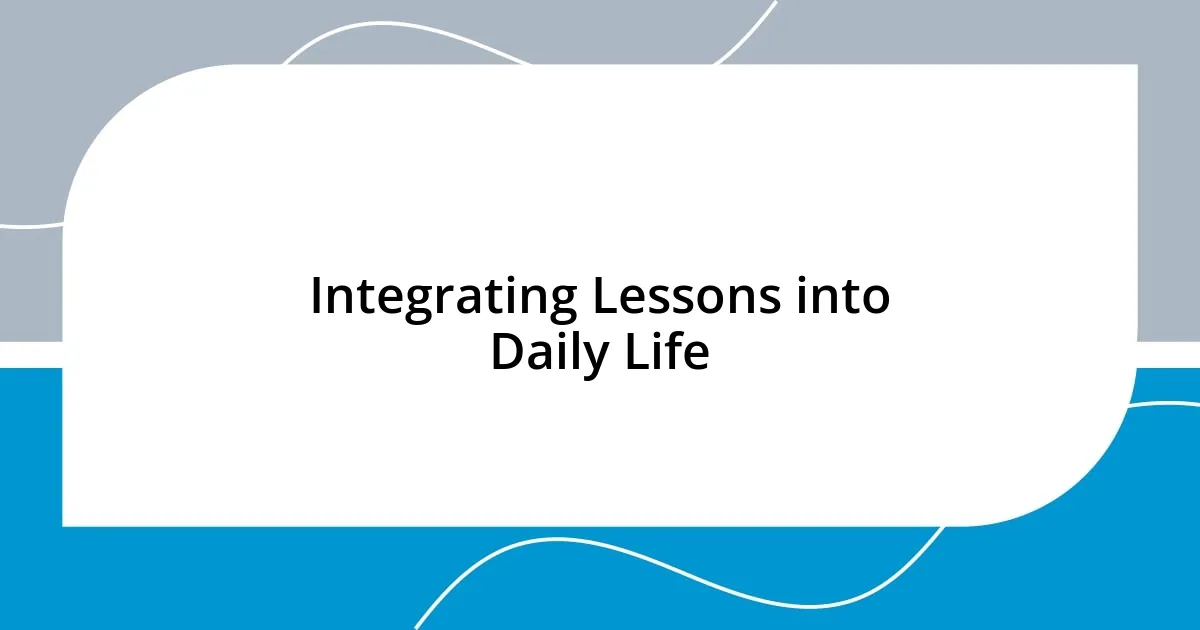
Integrating Lessons into Daily Life
Integrating the lessons from my mental health retreat into daily life has been a transformative journey. I started incorporating brief meditation sessions every morning, reflecting on the peaceful state I embraced during the retreat. It feels grounding; I find myself often asking, “What can I gain from just a few moments of stillness before the chaos of the day begins?” Those quiet moments have not only heightened my awareness but set a positive tone for my day.
One lesson that reshaped my perspective was the power of connection. After returning home, I made it a priority to share my experiences with friends and family. Our conversations have grown richer and more meaningful because I’m no longer afraid to show my vulnerabilities. I remember a dinner where I opened up about my fears; the responses were incredibly moving and reminded me how powerful it is to connect on a deeper level. Why is it that we often shy away from such openness, even though it can lead to profound understanding?
Self-compassion became a central theme for me, urging me to revive practices that nurture my well-being. I started a nightly reflection ritual where I jot down three things I appreciated about myself that day. Initially, I struggled to fill the page, but the more I practiced, the more I realized how often I overlook my achievements, no matter how small. It begs the question—how can we truly care for ourselves if we don’t recognize our own worth? By fostering this habit, I’m slowly redefining how I view my journey, embracing rather than critiquing who I am.
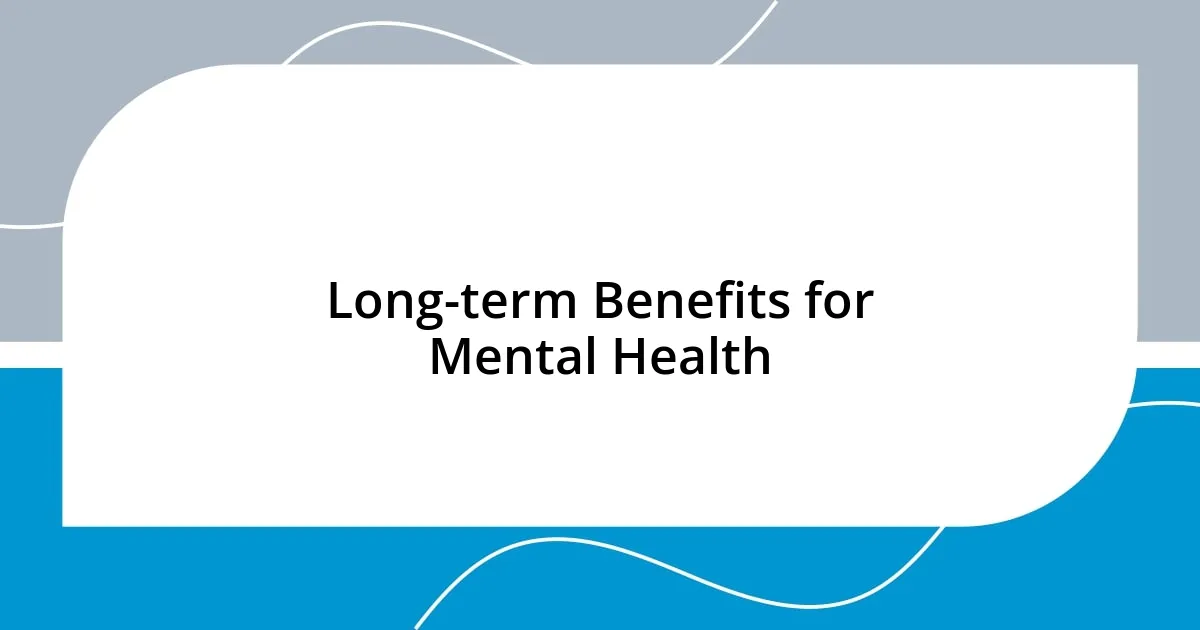
Long-term Benefits for Mental Health
One of the long-term benefits I’ve noticed since the retreat is a renewed sense of emotional resilience. Before attending, I often felt overwhelmed by stress, but now I approach challenges with a different mindset. I remember a particularly hectic week at work when everything seemed to pile up. Instead of spiraling into anxiety like I used to, I paused, took a deep breath, and utilized the mindfulness techniques I learned. It’s amazing how these simple practices can foster a profound shift in how we handle life’s pressures.
Additionally, I find that my relationships have deepened significantly. I had a candid conversation with my partner about some issues I had been dodging, fueled by the vulnerability I experienced during the retreat. Sharing my feelings allowed us to connect on a level I hadn’t anticipated. This openness not only strengthened our bond but also reminded me how important it is to cultivate trust and honesty in relationships. Isn’t it fascinating how communication can transform our interactions and elevate our connections?
Another enduring takeaway has been my commitment to practicing gratitude. Inspired by an exercise during the retreat, I started a gratitude journal. Each night, I jot down moments that brought me joy or peace. What surprised me the most was how quickly this practice shifted my perspective. Instead of fixating on the negatives, I began to see a wealth of positive experiences in my day-to-day life. How transformative can a simple act of acknowledgment be in shaping our overall mental well-being? It’s a powerful reminder that our minds flourish when we focus on what we appreciate.










